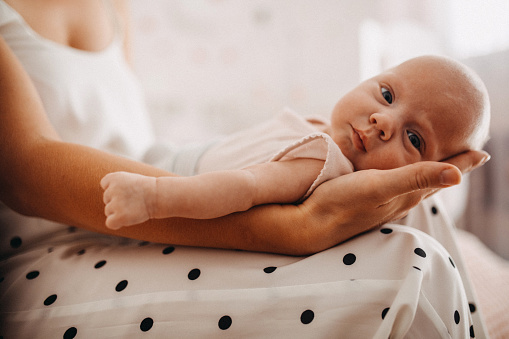These uncertain times may leave expectant mothers and those caring for new babies wondering what they need to do to keep themselves and their families safe.
Mothers who are not experiencing any of the signs and symptoms of COVID-19 should continue to take the necessary steps to stay healthy during this pandemic. The pregnancy and parenting sections of our website are full of helpful resources and information to assist new, expectant and experienced mothers with this.
MYTHBUSTER:
Do mothers need to have a caesarean section if they test positive for COVID-19?
NO! If expectant mothers suspect they have COVID-19, or have tested positive for the virus, it does not need to change their birth plan. However, it does mean that those who are caring for the mother will need to wear the proper protective equipment to protect themselves from being infected.
Expectant mothers can still have a safe and positive childbirth experience if they test positive for COVID-19. This includes being treated with respect and dignity, birthing with the support person of their choice as long as it is permitted by the hospital’s revised visitation policy during the pandemic, being allowed to move about freely in labour and being offered appropriate pain relief strategies.
Note: There is no current evidence of mother-to-child transmission through childbirth.
Mothers with COVID-19 are encouraged to:
- Do skin-to-skin with their baby immediately after birth to help babies get off to a good start with breastfeeding.
- Share a room with their baby in the hospital.
- Wash their hands before and after handling their baby and wear a respiratory mask while feeding or doing skin-to-skin.
Mothers with COVID-19 at home are encouraged to do skin-to-skin with their baby and breastfeed exclusively. Breastfeeding helps to decrease the risk to the baby as a mother’s milk has the antibodies that your baby needs to help fight infection. Breastmilk also sets up the baby’s immune system so that they are better able to fight infections later in life.
Mothers who are too ill to breastfeed, will need extra help to express their milk at least 8 times a day and have the support of another caregiver to feed the baby. It is still important for the baby to receive breastmilk if their mother is ill.
Mothers who are unable to breastfeed their child will need make sure they have a 14 day supply of formula for their child and all the equipment needed to sterilize feeding supplies after each feed. Homemade infant formula is not recommended. These recipes may not provide the proper balance of nutrients that infants need. Homemade infant formulas can cause severe malnutrition and potentially fatal illness in infants.
Another helpful resource for new and expectant mothers is: https://www.who.int/news-room/q-a-detail/q-a-on-covid-19-pregnancy-childbirth-and-breastfeeding
Please note that for Chatham-Kent expectant mothers who are planning to deliver at the Chatham-Kent Health Alliance (CKHA), CKHA is committed to a safe environment for new mothers and their babies. Visitor restrictions are currently in place and expectant mothers are encouraged to visit www.ckha.on.ca for the most up to date visitor restrictions.

